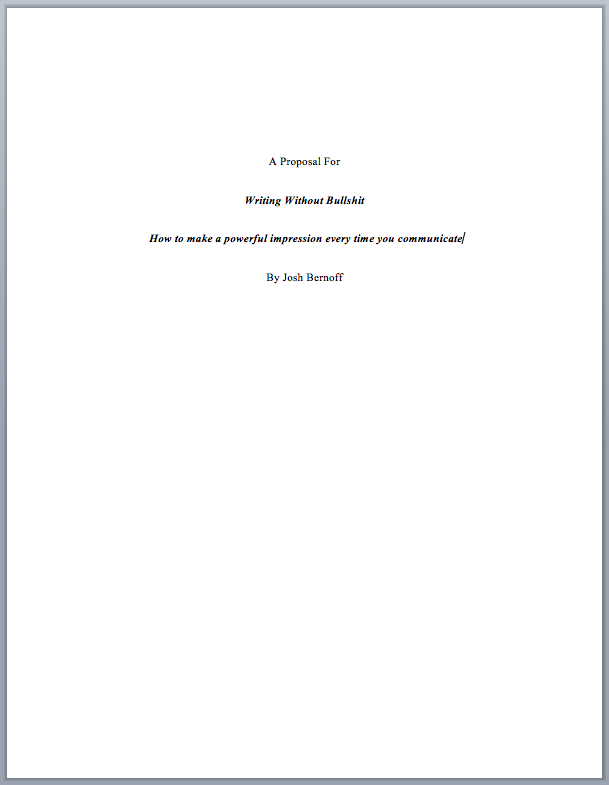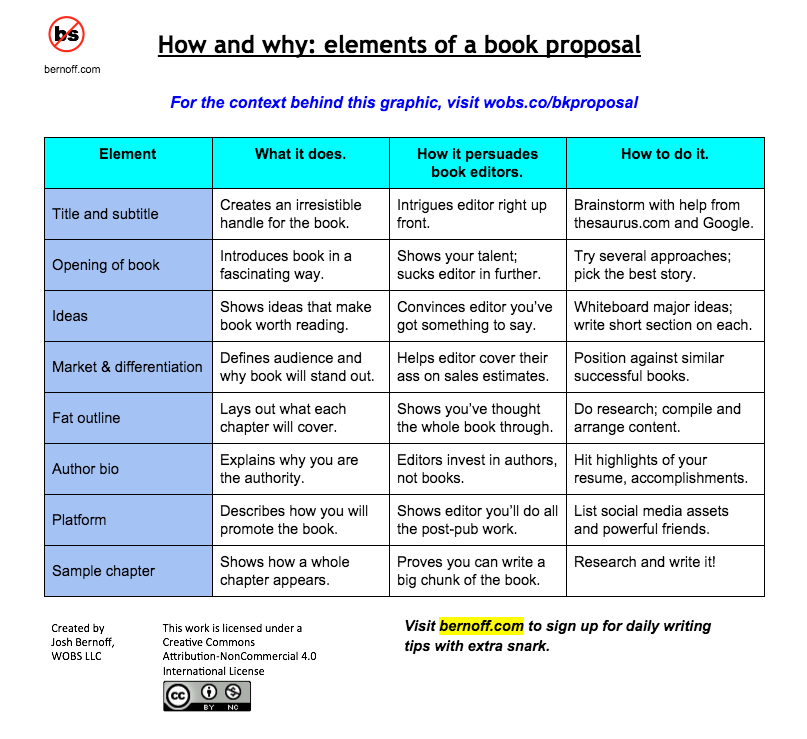How to write a book proposal that makes publishers drool
 If you want to publish a non-fiction book, don’t start by writing it. Start by writing a proposal. Tell the editor at a publishing house what’s in it and why it will sell. If you can’t do this, you’ll never be able to write (or sell) a book.
If you want to publish a non-fiction book, don’t start by writing it. Start by writing a proposal. Tell the editor at a publishing house what’s in it and why it will sell. If you can’t do this, you’ll never be able to write (or sell) a book.
Nobody writes a book first and then sells it. (All real authors know this.) Sell it first, then write. Here’s why:
- The editor at your publisher will want to change things, which is easier if you haven’t already written them all.
- Since you’re not going to see the book for at least 12 months, use that time to write instead of just waiting.
- Use the publisher’s advance to help support you financially while you write.
Instead of writing the book, write a proposal. If it’s good enough, that proposal, plus an agent or friend in publishing, will get you a publisher or advance. And as you’ll see, writing a proposal will also get you to think clearly about how you’ll write the book.
As usual, Jane Friedman’s post on this topic is extremely helpful.
If you want your book to sell, I need to get into your head. I’ve written or collaborated on six proposals, and sold five. Here’s what I learned: your proposal must demonstrate four things at the same time:
- You are a good writer.
- You have enough content to complete a book.
- The book has a large and juicy market.
- You have the tools to launch, promote, and sell the book.
Here’s a what to include, why it will persuade an editor, and how to do it. There’s a summary graphic at the end.
Title and subtitle
 What it does: The only thing on the first page of your proposal should be “A proposal for” plus the title, subtitle, and your name.
What it does: The only thing on the first page of your proposal should be “A proposal for” plus the title, subtitle, and your name.
How it persuades: More than anything else, a great title gets your proposal read. Without it, even if you sell the proposal, you’ll end up arguing titles with the editor, a process I call “title hell.” The subtitle explains what the book’s about.
How to do it: Do a title jam with some friends you trust. Write the flap copy, look for words that pop. Use thesaurus.com and Google to find words that you can own in searches.
Pages in proposal: 1
Opening of book
What: The first words of the Groundswell proposal were “Rick Clancy seemed worried.” Those were also the first words of the book. Start your proposal as you would start the book, writing to readers, not editors or publishers.
Why: Editors recognize writing that will suck people in. They react poorly when you try to talk them into something. (I learned this trick from this book.)
How: Be conversational. Tell a story. Get upset and start ranting. Get some words down. Try a few different ways to start, then pick the best or mix ’em up.
Pages: 2-3 pages double-spaced
Ideas
What: After a few pages of showing off what a great writer you are, explain the main ideas in the book. Graphics can help here.
Why: Unless the editor buys your overarching argument about the importance of the topic, they’ll never buy the book.
How: Whiteboard it out. Write a few short 3-5 paragraph sections and organize them.
Pages: 3-6
Market and differentiation
What: Tell who will buy the book. Explain how many people there are like that (people who do content marketing, for example, or people with psoriasis). And crucially, tell why your book is different or better. Bullet points work great in this section (“four reasons that this book will stand out”). It’s also helpful to position yourself against competing books.
Why: Publishers want market sizes. They don’t want to publish the same drivel that’s already out there. You need to help them cover their asses here.
How: Web research will get you market sizes. As for differentiation, if you can’t say why your perspective is unique, give up now and save yourself a lot of trouble. Always respect the other books — competing books in a market are more likely to help you than hurt you.
Pages: 3-5
A fat outline
What: Don’t just list the chapters. Tell us what’s in each one and how many pages long it is. Describe those chapters. You know, like this.
Why: This is where you convince the editor that you’ve actually thought this thing through.
How: Do your research. Spend some time compiling and arranging the content you think you will include. For each chapter, imagine you’re explaining to a friend: “This is what’s in this chapter.”
Pages: 3-7
Author bio
What: Tell them who you are — “about the author.” Prove that you are the not only the one to write this book, but the one who would be best at promoting it as well.
Why: Editors don’t invest in books, they invest in authors. Explain why you’re a good investment.
How: Take the highlights from your resume. Leave out the boring stuff.
Pages: 1 (if you can’t describe your qualifications in one double-spaced page, you’re Jed Bartlet or Elon Musk).
Platform
What: Describe of how you will launch and promote the book. You’ll need to line up speeches, promote on social media, create videos or infographics that spread, get media coverage, and persuade well-connected friends to promote or blurb the book. If you or your company are willing to spend money to promote, say that, too.
Why: More than ever, publishers expect you to do most of the promotional work. Unless you have a powerful “platform” from which to promote and launch, you’re dead.
How: Take stock of what your network can do for you (actual and virtual, both intimate and loosely tied). List actual names (“My mother-in-law is Barbara Walters and I have worked closely with Larry Page”).
Pages: 3-6.
Sample chapter
What: Submit a representative chapter (not Chapter 1).
Why: Shows how the book will read. Gives the editor confidence you can do a big project. (And it gets you about 10% done with writing the book.)
How: Research and write it as you would with the book.
Pages: 5-25
Photo: Lewis Clark.

I have this bookmarked and I keep coming back to it! My editor has been getting on me for the longest time (and my sister, and my mother) to get all of my notes together and finally do this book, but the kids, and the house, and the job, and the thing, and that thing, and all the other things… for the longest time I just didn’t know how to do it. I’ve made list after list – start here, go there – but none of them felt right. The kids are finally IN SCHOOL, so this is my big project for Fall 2015.
I think I followed your first blog post, and it has literally (and I don’t mean that in the figuratively-literally sense, I mean *literally* literally) been the best blog-follow choice I’ve ever made! My inbox is happy.
THANK YOU.
Thanks so much. I am certainly open to gushing praise.
Good luck with the book.
I have been asked by many people to write a book and I didn’t know how to approach it but this helps Thank you
It kind of sounds like it doesn’t matter if you’ve written a great book or not – it’s more who you know and how mercilessly you will pimp your book. If THAT’S the future of literature – I want out. We don’t need a platform – we need to change the way this industry works. Now. Before all the goodness and beauty is sucked from the publishing world like it is from civil service.
P.S. Rick Clancy really was worried 😉
I’m trying to find a publisher that would help me get my life story out. It has been a very interesting life. I grew up in a little town in West Virginia joined the military because the jobs were far and between there. My whole family has passed. I’ve been through alcoholism,drug addiction,divorce,love. I have nobody left except my son. It’s been a long and crazy life that I have been through at the young age of thirty seven and already been through more than some people have been through in two life times and I was wanting to get my story out so people know they can get on with there lives no matter what the world throws at you.